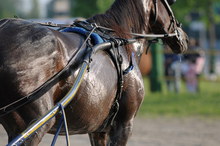There's no getting around it. With temperatures in triple digits, this summer may be miserable for both horses and humans. Horse owners and riders need to be very aware of the symptoms of heat stress, and act on them immediately. A rapidly breathing, sweaty horse can progress to heat stroke, which can be fatal, very quickly. A dull expression or behavior can also signal the onset of heat stress.

An overworked, overheated horse
The large muscle mass of a horse generates a tremendous amount of heat, particularly when exercising and, as they sweat, the horse looses both water and electrolytes, leading to dehydration.
When a horse's body becomes over heated either because of high temperatures or because of intense exercise under less than optimal conditions, it affects the horse's respiratory, vascular, nervous, and muscular systems and unless the horse is cooled down and lost fluids replaced, those systems will cease to function and the horse's body will shut down leading to severe damage or death.
Profuse sweating, rapid breathing, and rapid heart rate are indications that the horse is stressed and needs to be moved to a shady area, allowed to cool down, and given water to combat dehydration.
Heat production can increase as much as 50% during intense exercise. The horse sweats to move more blood to the capillaries under the skin and breathing rate increases to release built-up heat. The horse's system may be unable to keep up with the mounting heat to the point that he becomes dehydrated.
Heat exhaustion is characterized by rapid breathing (over 60 beats per minute), refusal to work, and coats that are dripping with sweat, while some horses exhibit thumping spasmodic jerking of the diaphragm or flanks. In addition, the horse may move very stiffly and abnormally, similar to a horse that is tying up.
Left untreated, heat exhaustion can rapidly turn into heat stroke. Heat stroke is evidenced by hyperthermia (a temperature of over 106 degrees) and a staggering, weaving gait. Horses may fall, rear, and seem unaware of their surroundings, making them dangerous to be around as they are unconscious of others. A coma and death may follow if they are not treated immediately.
Heat stress is not confined just to horses that are exercising. Horses that are in dry lots with no shade, in trailers, or in barns with no ventilation are also subject to the condition. So don't think that just because you are not working your horse, he won't be affected by the weather.
So what should a horse owner do? Think ahead!
There are many things that can be done to prevent heat stress:
- Provide plenty of clean water at all times. And remember horses need much more water during periods of extreme heat.
- Put horses on electrolytes. A heavily sweating horse will lose not only water, but electrolytes, which need to be replaced.
- Be sure horses have access to shade, and in a hot barn, provide fans.
- Don't leave horses in hot trailers.
- Ride in the early morning or late evening.
- Clip horses with long coats.
- Overweight horses are particularly susceptible so try to keep your horses at a healthy weight.
But what if it's too late and the damage has already been done? You have a dragon-breathing horse with a temperature over 105 degrees, what now?
Start with a cold shower. Studies conducted at the Atlanta Summer Olympics proved that there is no harm, only help, in applying cold water to an overheated horse.
Application of cold water to the overheated horse helps to dissipate heat by providing more water to evaporate from the skin, and by direct conduction of the horse's body heat into the water that runs off the horse, carrying excess heat with it.
Use a sweat scraper to remove excess water and then walk the horse or let it out in a shady area or a cool stall. Do not use a sheet in hot, humid conditions; it prevents the evaporation of sweat from the skin.
If the horse cannot be cooled down, the nervous and muscular systems will cease to function normally. When these systems stop functioning, heat stroke is inevitable unless measures are taken to cool the horse down and replace fluids lost because of sweating. If heat stroke is suspected, the veterinarian should be called immediately and steps taken to cool both the horse and the environment.
Knowing the horse's normal resting and at-work heart rates, normal rectal temperature, and normal respiration rate can serve as a guide to prevent over-exercising a horse when the weather is hot and humid. Normal vital signs for adult horses, according to the American Association of Equine Practitioners, are as follows: temperature: 99-100.8 F; heart rate: 28-44 beats per minute; respiration: 8-20 breaths per minute; rectal temperature: 101 F.
A simple pinch test can help determine if the horse is dehydrated. When a small section of skin on the horse's neck or shoulder is pinched and released, the skin should snap back into place. If there is a delay, the horse could be dehydrated.
In their summer HealthFlash, Equine Guelph has an graphic poster that serves as an excellent reminder: If you are hot, your horse is hotter.
Tips from #EquineGuelph to avoid heat stress.
